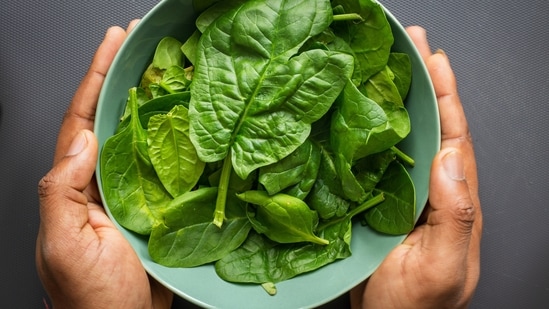Delhi nutritionist shares 5 everyday foods to reduce the stress of pollution on body: Spinach, turmeric and more
Reduce the stress of pollution on your physiological system with the help of nutrient-rich additions to your diet, as suggested by a nutritionist.
Pollution is a major health crisis right now. The toxic air you breathe does more than cause respiratory issues. It exerts stress on your entire body. To combat the ill effects of pollution, we install air purifiers. But what about supporting your body from the inside? The foods you include in your diet, particularly during pollution, play a critical role in strengthening your lungs, liver, and overall immunity. So, how do you ensure you stay on top of your health?

To understand which foods to include in your diet to reduce pollution stress, HT Lifestyle reached out to Payal Sharma, senior nutritionist and dietician at Dharamshila Narayana Superspeciality Hospital in Delhi.
“The ‘invisible stressor,’ commonly termed as pollution, can deplete our health in many ways, which can include weakening the immune system or causing oxidative damage in our lungs and liver, leaving our body vulnerable,” Payal explained, reminding us how pollution is not just an environmental problem. It extensively affects the body, with the immune system taking the first hit. Other vital organs also get impacted by free radicals from pollution.
While polluted air can't entirely be avoided, even with a purifier, you can strengthen your body's defences from the inside. “Bypassing pollution entirely is practically impossible, but the foods we eat play a significant role in helping our bodies cope with pollution-related stress,” she noted.
To counter pollution's stress, the foods need to include certain molecules which help in filtering out the toxins. Describing the compounds, Payal added, “Certain foods that are rich in antioxidants and natural compounds support detoxification, protect our cells, and strengthen organs such as the lungs and liver.”
1. Spinach

The first recommendation is a leafy green veggie. As per Payal, spinach should be added to your diet because it contains vitamin C, beta-carotene, and magnesium. They are all responsible for reducing oxidative stress caused by air pollution.
Moreover, the green pigment in spinach helps flush out toxins. Payal added, “The chlorophyll in spinach supports detoxification and promotes lung health. Including spinach in your meals regularly can help your body better manage pollution-related damage.”
2. Amla (Indian Gooseberry)

Vitamin C, as per the dietician, is one of the richest natural sources of Vitamin C, which supports the body in filtering toxins and strengthening the immunity while supporting the decontamination of the liver.
“Consuming amla daily can strengthen your body’s natural defence mechanisms against environmental toxins,” she noted.
3. Turmeric

The third food on the list is a spice that is a staple in every Indian kitchen. It has great benefits as it contains curcumin.
Elaborating on the benefits of curcumin, Payal explained, “Curcumin is a powerful anti-inflammatory compound that helps fight inflammation and tissue damage caused by pollution. Curcumin also helps in supporting liver functions."
4. Walnuts

Healthy fats also help combat the ill effects of pollution. One of the recommended sources is walnuts. Payal advised, “Eating a handful of walnuts each day can significantly aid your body in coping with pollution-related stress.”
Since walnut contains omega-3 fatty acid, she noted, they help to lower inflammation and protect the lungs from oxidative damage.
5. Broccoli

Broccoli rounds up this list because it is a good source of essential nutrients like sulforaphane and vitamin E. Payal described what these nutrients do: "Sulforaphane and vitamin E activate the body’s natural detox enzymes. This helps eliminate airborne toxins and strengthens the overall antioxidant defence system." Moreover, regularly eating broccoli improves the body's resilience against pollution.
So while pollution can't be entirely escaped from, you can safeguard yourself with the help of dietary modifications, adding nutrient-rich options to diet.
Note to readers: This article is for informational purposes only and not a substitute for professional medical advice. Always seek the advice of your doctor with any questions about a medical condition.
Catch your daily dose of Fashion, Taylor Swift, Health, Festivals, Travel, Relationship, Recipe and all the other Latest Lifestyle News on Hindustan Times Website and APPs.
Catch your daily dose of Fashion, Taylor Swift, Health, Festivals, Travel, Relationship, Recipe and all the other Latest Lifestyle News on Hindustan Times Website and APPs.


 E-Paper
E-Paper



